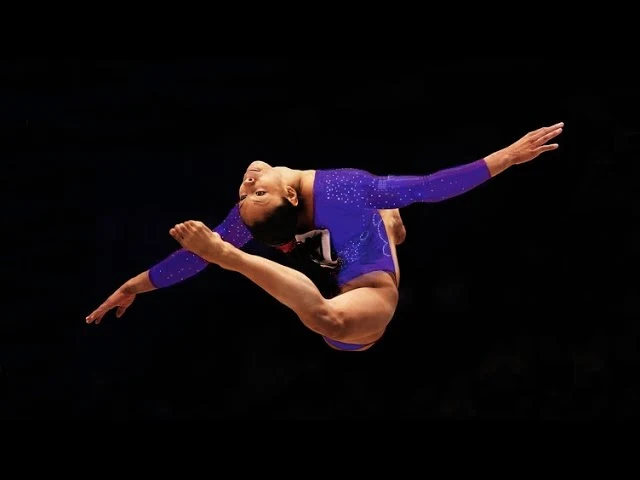The level of difficulty for gymnastics skills increases as you move up through the levels & surely it is one of the hardest sport. To become good at gymnastics, you must be able to master the basic skills at each level. You must also have the strength, agility, and coordination to execute the more difficult skills.
Olympic-level gymnastics requires athletes to be incredibly strong, flexible, and coordinated. They must be able to execute extremely difficult skills with precision and perfect form.
Today’s famous gymnasts emphasizes extreme difficulty and power, with athletes performing skills once considered impossible, while past routines focused more on classical form, elegance, and artistry.
The sport’s scoring system has also shifted from a perfect 10 to a code of points that rewards unprecedented risk and complexity.
10. Vitaly Scherbo
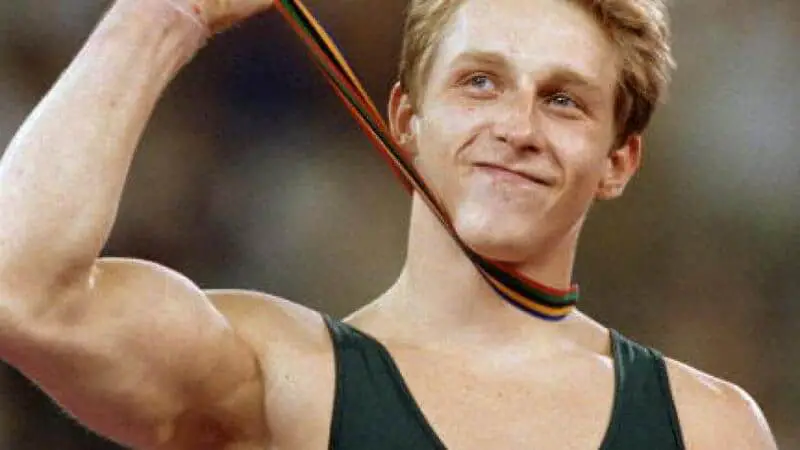
Vitaly Scherbo is considered one of the greatest gymnasts ever due to his unprecedented dominance across all events, extraordinary versatility, and a record medal haul that remains unmatched in men’s gymnastics.
Scherbo won six gold medals at the 1992 Barcelona Olympics, which is more than any gymnast at a single Games and the most for any athlete of those Olympics, including four golds won in a single day.
He remains the only male gymnast to win world titles on every apparatus and the all-around, proving unmatched all-around excellence.
His career totals are staggering: 10 Olympic medals (six gold, four bronze), 23 World Championship medals (12 gold, seven silver, four bronze), 10 European Championship titles, and two World Cups.
Scherbo’s versatility meant he was a genuine contender for medals in every event, an achievement no other male gymnast has matched.
His technical innovation also lives on, with a vault named after him in the Code of Points, reflecting his contributions to the sport’s evolution.
Scherbo’s legacy is reinforced by his induction into the International Gymnastics Hall of Fame and ongoing recognition as an icon of the sport.
His incredible comeback, by winning four Olympic bronze medals in 1996 despite trauma and limited preparation, has inspired generations of gymnasts and sports fans worldwide.
9. Kohei Uchimura
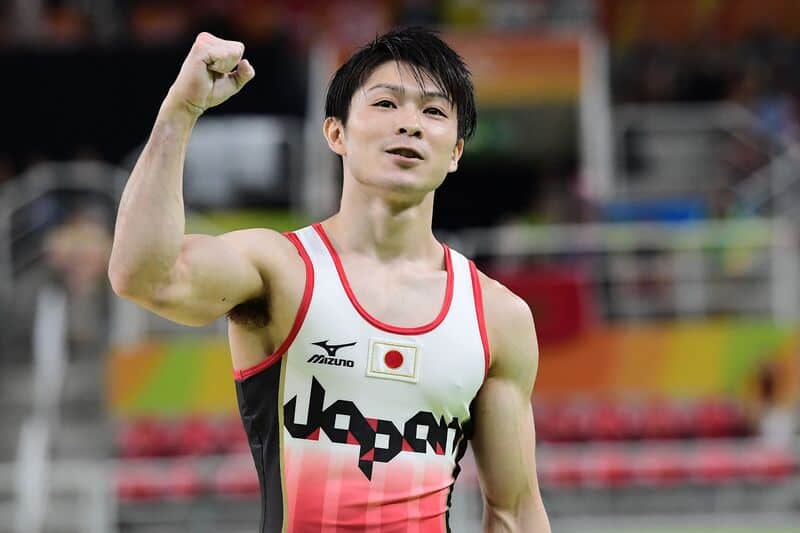
Kohei Uchimura is revered as one of the greatest male gymnasts for his exceptional all-around consistency, precision, and dominance over nearly a decade.
Widely called “King Kohei” and “Superman,” Uchimura became the only gymnast (male or female) to win six consecutive World Championship all-around titles (2009–2015) and two back-to-back Olympic all-around gold medals (2012, 2016), a feat unmatched in modern gymnastics.
During his illustrious career, Uchimura earned seven Olympic medals (three gold, four silver) and 21 World Championship medals (ten gold, six silver, five bronze), excelling on every apparatus while producing some of the most difficult yet flawlessly executed routines in history.
His “two Olympic cycles of dominance” saw him win every major all-around title, including Worlds, Olympics, Asian Games, and national championships twice, an achievement recognized globally by sports magazines and experts for its supreme consistency and elegance.
Uchimura’s technical mastery, artistry, and rare composure set new standards for the sport, and he is celebrated for both his individual excellence and leadership of a resurgent Japanese team.
Japan has produced great gymnasts like Daiki Hashimoto, Shinnosuke Oka, including Sawao Kato, an 8-time Olympic gold medalist, as part of its rich gymnastics tradition marked by decades of dominance in men’s gymnastics during the 1960s and 1970s.
His historic run and legacy as the “greatest gymnast of the 21st century” continue to inspire generations of athletes worldwide.
8. Vera Caslavska
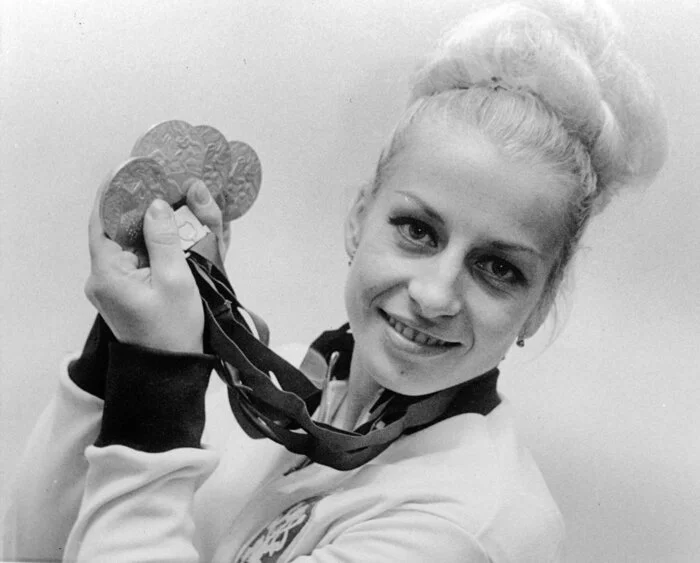
Vera Caslavska is the first and only gymnast, male or female, to win an individual Olympic gold medal in every single women’s event: the all-around, uneven bars, balance beam, vault, and floor exercise.
Vera earned gold medals in vault and all-around competitions in 1964 and 1968, setting a record for the latter event she shares with the great Russian gymnast Larisa Latynina.
She won gold medals at the Olympics in both 1964 and 1968.
Her huge win margin of 1.4 points is still the greatest across all women’s Olympic, World, and European Championships. She won the all-around championship in 1968 with the all-time highest score.
7. Nikolai Andrianov
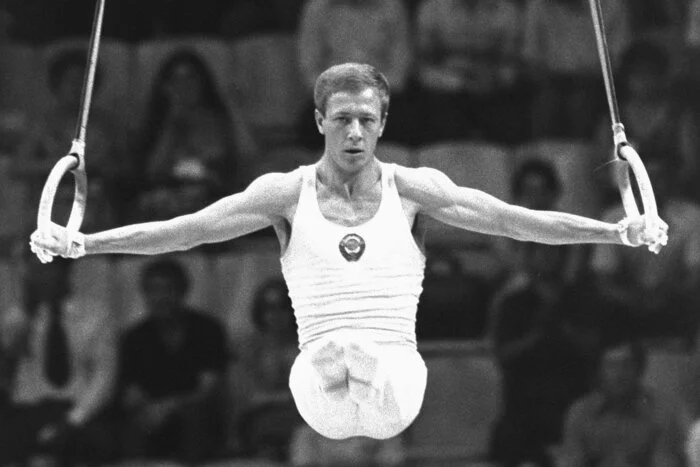
Nikolai Andrianov was Russia’s most decorated male gymnast and the second-most decorated male athlete in the history of the Olympic Games.
He won 15 Olympic medals in addition to 12 World Championship and 18 European Championship medals, giving him an unsurpassed total of medals.
He was victorious in 20 Olympic, World, and European competitions and seven World Cups.
Before the American swimmer Michael Phelps overtook him in the year 2000, he held the record for most Olympic medals won by a male athlete with a total of 15.
Even though he wasn’t the most naturally talented gymnast, he maintained his consistency because of his drive.
6. Shannon Miller

Shannon Miller is one of the most decorated American gymnasts, earning a total of seven Olympic medals and nine World Championship medals between 1991 and 1996, making her the second-most decorated U.S. gymnast after Simone Biles.
At the 1992 Barcelona Olympics, she won five medals: two silver and three bronze, the most medals won by a U.S. athlete at those Games, including a near-gold in the all-around event, missing first place by only 0.012 points.
She followed this by becoming the first U.S. gymnast to win back-to-back world all-around titles in 1993 and 1994, while collecting a total of nine world medals.
In the 1996 Atlanta Olympics, Miller led the “Magnificent Seven” to earn the first-ever U.S. women’s team gold and also became the first American gymnast to win individual gold on the balance beam at a fully attended Olympics.
Over her career, she amassed 59 international and 49 national competition medals, with more than half being gold. Miller further distinguished herself as the first female athlete to be inducted into the U.S. Olympic Hall of Fame twice, once as an individual and once with her team.
5. Olga Korbut
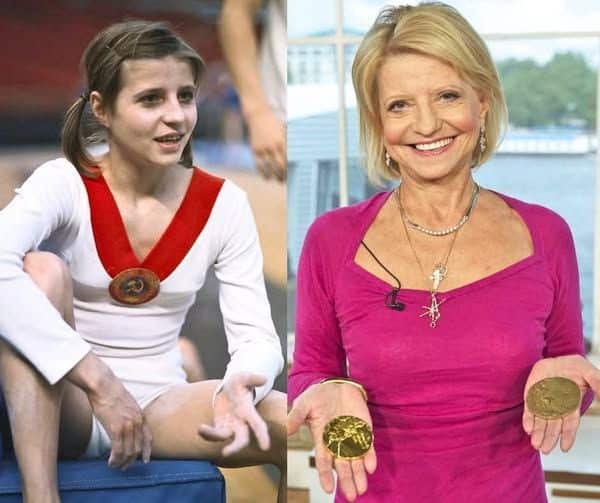
Olga Korbut is widely recognized as a revolutionary figure in gymnastics whose performances and innovations profoundly transformed the sport.
At the 1972 Munich Olympics, the Belarusian gymnast dazzled the world by winning three gold medals in the team event, balance beam, and floor exercises, along with a silver medal on the uneven bars.
She is best known for introducing the “Korbut flip,” a daring backflip executed on the uneven bars from a standing position on the high bar, which has since been banned for its high risk but left an enduring legacy in gymnastics technique and artistry.
Korbut’s charismatic personality, combined with her groundbreaking athletic feats, helped shift gymnastics from a sport focused primarily on ballet-like elegance and older athletes to one emphasizing acrobatics and youthful dynamism.
Her radiant performances at the 1972 Olympics are credited with dramatically increasing the sport’s popularity worldwide, turning gymnastics into one of the most-watched Olympic sports.
She continued her success by winning another team gold and a silver on the balance beam at the 1976 Montreal Olympics despite dealing with injuries.
Beyond her medal count (four Olympic golds and two silvers), Korbut’s impact lies in her trailblazing gymnastic innovations, her role as a beloved ambassador of the sport, and her ability to inspire future generations of top gymnasts.
4. Svetlana Khorkina
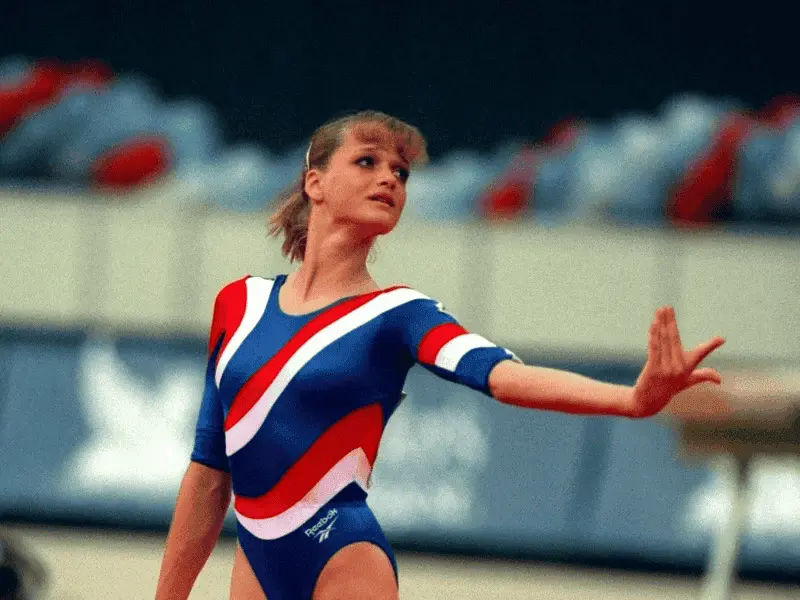
Svetlana Khorkina is widely regarded as one of the top female gymnasts thanks to her impressive achievements, creative skills, and long career at the highest level.
She is the first gymnast to win three World Championship all-around titles (1997, 2001, and 2003) and has amassed a remarkable collection of 47 Olympic, World, and European Championship medals, including seven Olympic medals and twenty World Championship medals.
Khorkina’s dominance, especially on the uneven bars where she won two Olympic golds (1996, 2000) and five World titles, showcases her extraordinary skill and consistency across multiple events.
At 1.65 meters, Khorkina was taller than most gymnasts, so she created new moves to fit her build. As a result, eight elements in the Artistic Gymnastics Code of Points are named after her, more than any other gymnast.
Her artistry, technical prowess, and competitive spirit helped her win multiple European all-around titles and medals on vault, floor exercise, and balance beam.
For almost ten years, she was a key figure in Russian gymnastics. Her resilience and charisma inspired many through three Olympic Games: 1996, 2000, and 2004.
3. Nadia Comaneci
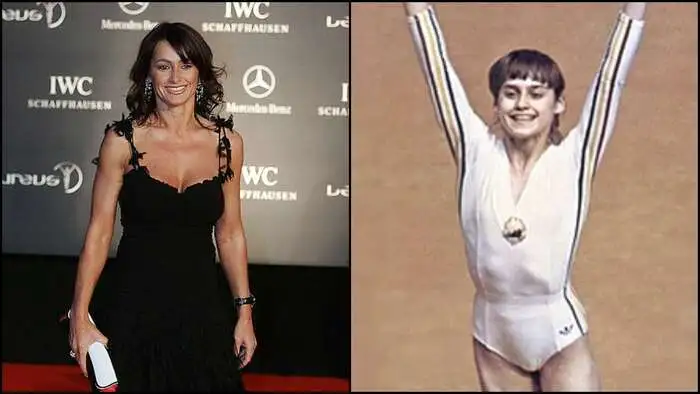
By age 14, Nadia Comaneci had already achieved remarkable success. At the 1976 Montreal Olympics, she became the first gymnast to score a perfect ten on the uneven bars and went on to earn three gold medals.
She continued her winning streak at the 1980 Moscow Olympics, adding two more golds and two silvers, for a total of nine Olympic medals.
Her excellence on the balance beam and floor routine even led to an exercise being named after her.
2. Larisa Latynina
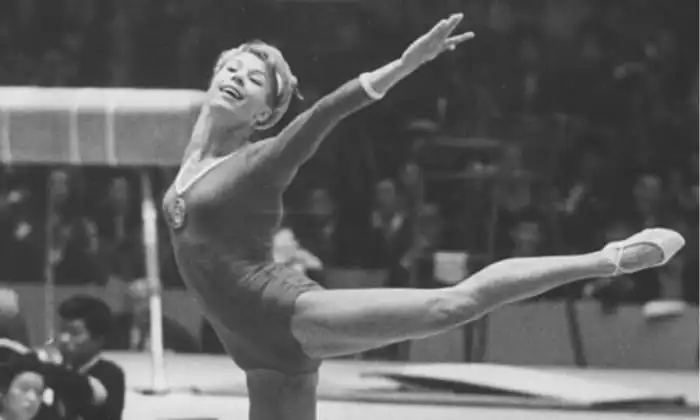
Latynina, a gymnast from Russia, won the all-around title at the Olympics twice (1956 and 1960) and is now ranked second on athletes with most gold medals in Olympics (until Michael Phelps broke the record).
She has won fourteen awards, including nine gold, five silver, and four bronze.
Throughout this period, the Soviet Union held a dominant position in gymnastics; yet, during the Olympics of 1956, 1960, and 1964, Latynina was the undisputed champion.
She currently has 18 medals to her name, making her the second most decorated Olympian in the history of any sport.
1. Simone Biles
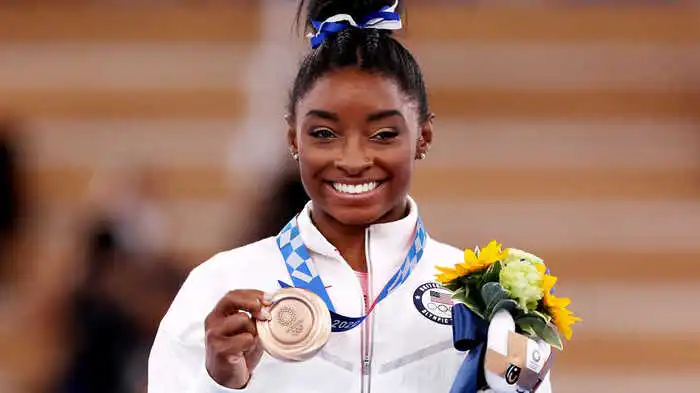
Simone Biles is unquestionably the best gymnast who has ever competed, and she is very comfortable with that title.
She is a seven-time champion in the United States all-around event. She is the all-time leader in gymnastics with 25 medals, including 25 from the World Championships.
In addition, she holds the record for the most gold medals won at the World Championships with 19, more than any other gymnast in history.
When Simone took a sabbatical from gymnastics in 2017, she even appeared on Dancing with the Stars and penned a best-selling book.
What other aspects of a champion’s performance can possibly be represented by these stats?
Gymnastics presents a unique paradox: its fundamental skills are easy for any amateur gymnast to try, but the elite-level strength, flexibility, and precision required cement its status as the ultimate test of athleticism.
The unparalleled athleticism required for gymnastics mastery provides the ultimate benchmark for these ten legends; their iconic careers, defined by gravity-defying innovation and flawless execution, have permanently elevated the sport’s competitive landscape and redefined the very limits of human potential.
